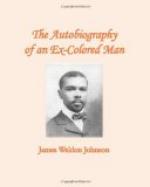My mother broke the spell by calling me by name and saying: “This is your father.”
“Father, father,” that was the word which had been to me a source of doubt and perplexity ever since the interview with my mother on the subject. How often I had wondered about my father, who he was, what he was like, whether alive or dead, and, above all, why she would not tell me about him. More than once I had been on the point of recalling to her the promise she had made me, but I instinctively felt that she was happier for not telling me and that I was happier for not being told; yet I had not the slightest idea what the real truth was. And here he stood before me, just the kind of looking father I had wishfully pictured him to be; but I made no advance toward him; I stood there feeling embarrassed and foolish, not knowing what to say or do. I am not sure but that he felt pretty much the same. My mother stood at my side with one hand on my shoulder, almost pushing me forward, but I did not move. I can well remember the look of disappointment, even pain, on her face; and I can now understand that she could expect nothing else but that at the name “father” I should throw myself into his arms. But I could not rise to this dramatic, or, better, melodramatic, climax. Somehow I could not arouse any considerable feeling of need for a father. He broke the awkward tableau by saying: “Well, boy, aren’t you glad to see me?” He evidently meant the words kindly enough, but I don’t know what he could have said that would have had a worse effect; however, my good breeding came to my rescue, and I answered: “Yes, sir,” and went to him and offered him my hand. He took my hand into one of his, and, with the other, stroked my head, saying that I had grown into a fine youngster. He asked me how old I was; which, of course, he must have done merely to say something more, or perhaps he did so as a test of my intelligence. I replied: “Twelve, sir.” He then made the trite observation about the flight of time, and we lapsed into another awkward pause.




